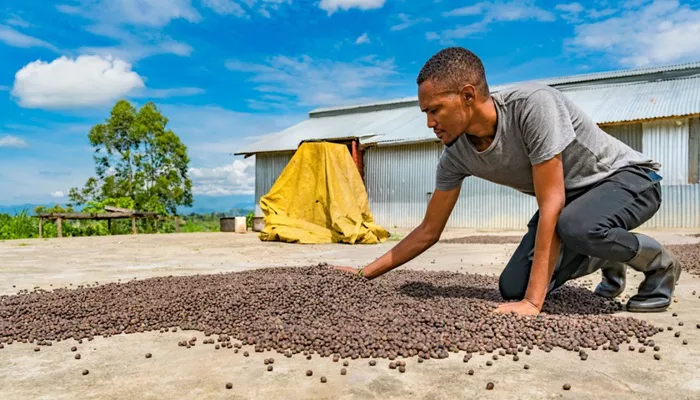Cornell University, in collaboration with World Coffee Research (WCR), has announced a significant new initiative aimed at enhancing the resilience and productivity of smallholder coffee farmers worldwide. Funded by a robust investment exceeding $5 million from the United States Agency for International Development (USAID), the Coffee Improvement Program seeks to tackle the pressing production challenges faced by these essential growers while bolstering global coffee supply chains.
Globally, more than 12 million smallholder coffee farmers, each cultivating less than five hectares (approximately 12 acres), are responsible for 60% of the world’s coffee production. Despite their critical role in the industry, these farmers are increasingly vulnerable to the adverse effects of climate change and a lack of agricultural innovation. The longevity of coffee trees—typically 30 years—means that those planted today will be subjected to the ongoing climate crisis, jeopardizing both the livelihoods of these farmers and the integrity of the coffee supply chain.
The Coffee Improvement Program is designed to protect the future of coffee farming. It is spearheaded by Cornell’s Feed the Future Innovation Lab for Crop Improvement (ILCI) and WCR, an organization dedicated to advancing research in the coffee sector. The initiative will facilitate the rapid development of resilient, high-quality coffee varieties in partnership with national coffee research institutes in coffee-producing nations.
Set to span five years, this program will be based within Cornell’s School of Integrative Plant Science (SIPS) as part of the College of Agriculture and Life Sciences. Its primary focus will be on advancing breeding tools to enhance disease resistance and improve quality assessment methods. A key component of the initiative will include a case study aimed at strengthening seed systems to ensure inclusive market access to improved coffee varieties.
This new coffee program builds on a recent $25 million investment from USAID to ILCI, aimed at developing innovative tools, technologies, and methodologies for public plant breeding programs in countries striving to enhance food security and nutrition. Additionally, ILCI may receive up to $9.5 million in further funding to support its efforts.
Vern Long, CEO of WCR, emphasized the importance of this public-private partnership, stating, “By integrating ILCI’s cutting-edge expertise in crop improvement with the coffee industry’s investments in global breeding, we can enhance the resilience of coffee farmers worldwide and ensure a diverse supply of coffee for the industry.”
Long underscored the economic significance of coffee, noting that it supports approximately 2.2 million jobs in the United States and contributes $343 billion to the U.S. economy. He highlighted the necessity of safeguarding the resilience of coffee smallholders, which is vital not only for local economies but also for global supply chains. “This collaboration with Cornell and the Innovation Lab for Crop Improvement will expedite the development of the next generation of coffee varieties, benefiting both smallholder farmers and the coffee industry,” he added.
Monique Oxender, Chief Corporate Affairs Officer at Keurig Dr Pepper and a board member of WCR, also recognized the importance of such partnerships. “Public-private collaborations are essential for developing resilient plants that deliver the high quality and diverse flavor profiles consumers demand. We encourage further collaboration to bridge coffee’s longstanding innovation investment gap and scale innovative solutions,” she stated.
Key components of the partnership include:
Development of Breeding Tools: The initiative will focus on creating tools that enhance the precision and speed of coffee breeding. This includes identifying genetic markers for coffee berry disease and coffee leaf rust—two significant threats to coffee production. Additionally, high-throughput evaluation tools for sensory quality will be developed for both Arabica and Robusta varieties, ensuring that new cultivars meet global market standards.
Capacity Strengthening: National coffee breeding programs in nine coffee-producing nations will receive state-of-the-art tools and training to improve their breeding efforts and operational efficiency. This capacity-building effort will specifically target scientists in Africa, Asia, and Latin America, enabling a quicker response to both climate-related challenges and market demands.
Seed Systems Case Study: Limited access to high-quality seeds poses a significant challenge for coffee farmers globally, obstructing the distribution of improved varieties. The initiative will undertake a focused effort to create a tool for assessing seed supply and demand dynamics, thereby ensuring equitable access to superior planting materials for smallholder farmers. This effort aligns with ILCI’s commitment to promoting inclusive adoption and scaling of new varieties, facilitating the broader dissemination of improved coffee cultivars through enhanced seed systems. The tools developed will address common seed lot challenges faced by coffee producers worldwide and provide insights for scaling technologies on a global scale.
Stephen Kresovich, director of ILCI and a professor of plant breeding and genetics at SIPS, reaffirmed the organization’s commitment to innovation. “At the Innovation Lab for Crop Improvement, we are dedicated to developing advanced tools, technologies, and methodologies applicable to a variety of crops, including perennial crops like coffee. This partnership exemplifies our mission to equip breeders with the innovations necessary to deliver resilient, high-performing varieties to farmers, ensuring their sustainability amid changing climatic conditions.”
The Coffee Improvement Program builds upon the coffee industry’s Innovea global Arabica coffee breeding initiative, launched in 2022, and will expand to include a Robusta breeding program set to begin in 2025. By leveraging ILCI’s extensive network of breeders and advanced research tools, the program aims to modernize coffee breeding practices, ensuring that smallholder farmers have access to high-performing varieties that will meet future demands.
This ambitious initiative represents a crucial step toward securing the future of coffee production and enhancing the livelihoods of millions of smallholder farmers around the world, ultimately benefiting the entire coffee supply chain.
Related Topics:
Bad Ass Coffee Brews New Opportunities in South Carolina
New Love Coffee: Where Community Meets Quality in Every Cup
Savoring Nature: Campfire Coffee Co. Combines Coffee and Conservation


